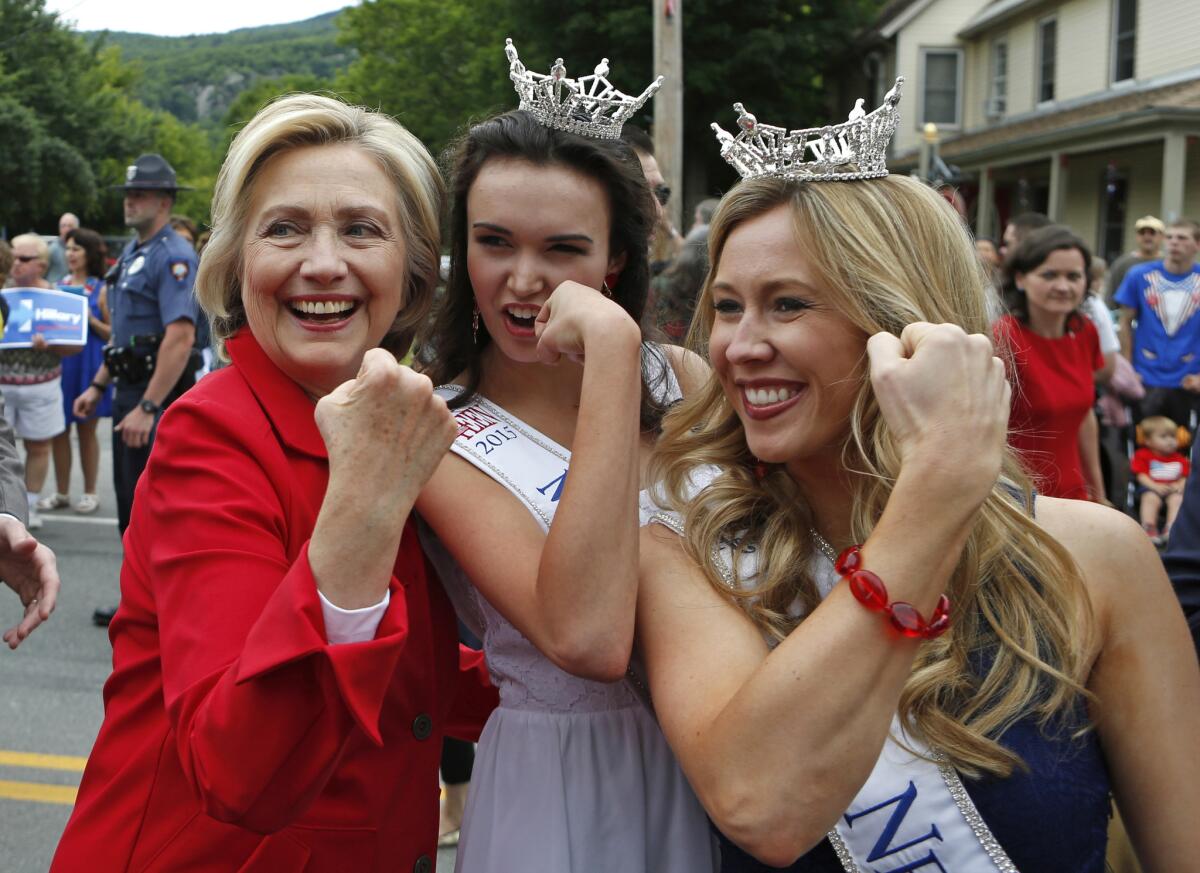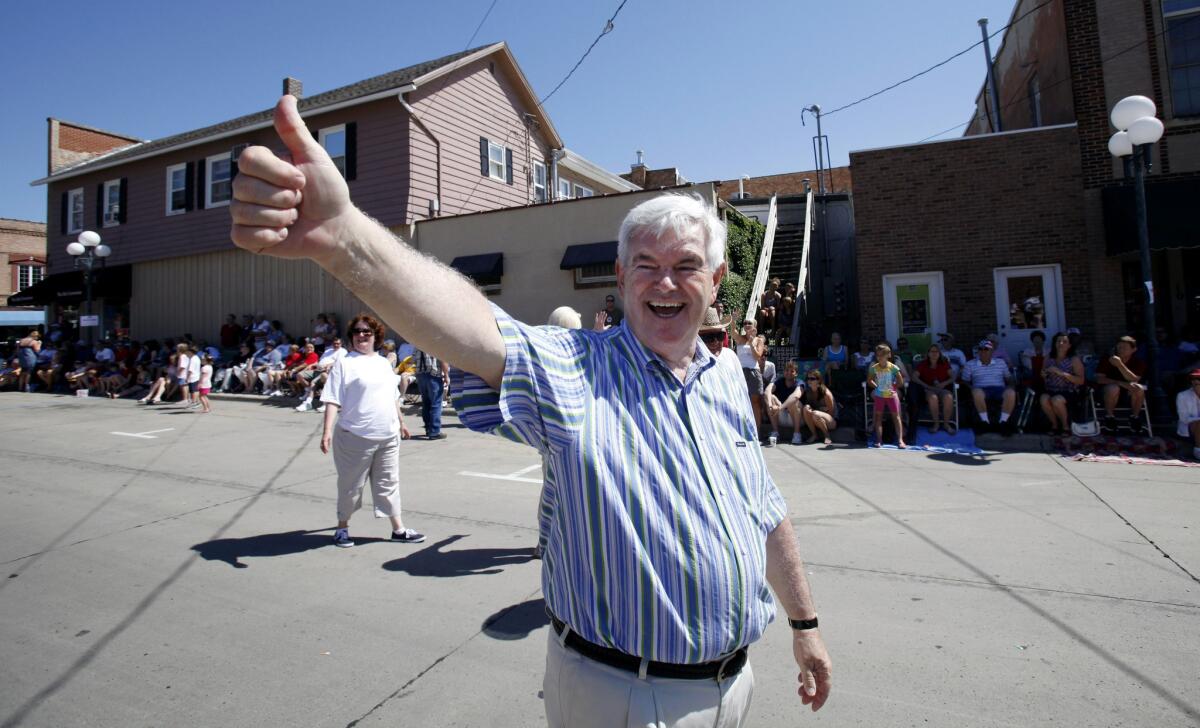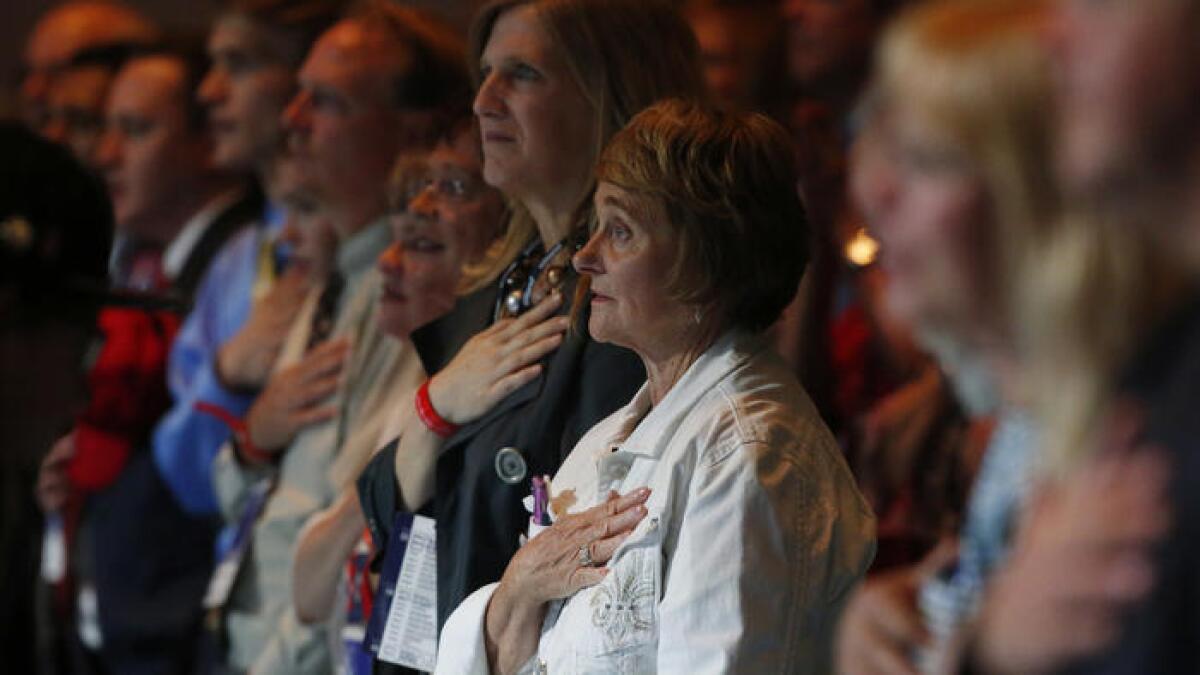Donald Trump is slammed for his since-deleted tweet attacking Hillary Clinton.
- Trump faces accusations of anti-Semitism after tweeting an image of Clinton, $100 bills and a six-pointed star
- The FBI interviewed Clinton about her use of a private email server
Catch up with these #longreads over the holiday weekend:
- How Trump handles competition: Go inside his secret smear campaign against an Indian casino
- How Tim Kaine went from “wild card” vice presidential pick to shortlist favorite
- The time House Democrats mistakenly released a transcript confirming a big payout for a Clinton pal
How you can tell a Trump or a Clinton supporter based on TV shows and restaurants they like
Can you tell a Trump supporter by the television shows she watches, or a Clinton supporter by his favorite restaurant?
Resonate, a data and analytics firm based in Reston, Va., sent over some fun data it collected, analyzing survey results from thousands of consumers. It’s the type of data often used to target voters, but it’s also a good way to evaluate how cultural differences correlate with political preferences.
Television: Donald Trump’s core supporters are more likely than average Americans to prefer crime dramas such as “NCIS” and “Criminal Minds.” They also like “Last Man Standing,” starring Tim Allen, which ABC describes as “a show about everything that families are dealing with today — all filtered through the blunt ‘man’s man’ comedy of an iconic American dad.” Hmm, sound familiar?
Hillary Clinton’s core supporters like “Scandal” and “Grey’s Anatomy,” both shows from creator Shonda Rhimes that star women.
Fans of both candidates like talent competitions more than average Americans. Trump backers are a bit more partial to “The Voice,” while “American Idol” does better with Clinton’s core voters.
Sports: Trump fans are big on car racing and golf, Trump’s personal passion. Clinton fans like basketball, both college and pro, a bit more than average Americans.
Drinking: Trump backers like rum and domestic beer more than Clinton backers, who favor vodka and craft beer more than Trump voters. Clinton’s supporters are also more likely to imbibe at a bar or restaurant than Trump’s. This jibes with the larger electoral map that shows Democrats more likely to live in cities and Republicans congregated in rural areas.
Cars: Supporters of Trump — who has railed against foreign trade deals — more likely than Clinton’s backers to buy America’s most popular brands, Chevy and Ford. They also like SUVs more than Clinton supporters, which may also relate to the urban/rural divide between the political parties.
Dinner: Both Clinton and Trump backers enjoy a nice evening at Outback Steakhouse more than typical Americans. Trump backers are especially partial to the chain. Both camps also like Buffalo Wild Wings. But if you head over to Olive Garden, you’re a lot more likely to find a Clintonite than a Trumper.
Trump fans love Domino’s Pizza. But don’t try taking them to McDonald’s. It may be Trump’s favorite fast food joint, but his voters are more keen on Subway.
Trump inspires supporters’ angst and anger over trade, but at what cost?
Carole Ann Powers was shopping for stationery not long ago — she still likes to send handwritten notes the old-fashioned way — when she found herself turning over the box to read the fine print: Made in China.
The Donald Trump supporter says she took a pass, preferring to spend her money on American-made goods.
“Gosh, that’s how I feel: Bring the jobs back,” said Powers, the daughter of a steelworker, volunteering at Trump headquarters in Monroeville, Pa., earlier this campaign cycle. “We’ve lost everything. Even our Oreos,” she said. “I will not buy anything from any other country.… I don’t even care what the price is. ”
Trump has tapped into concerns about trade policies as few others in the Republican Party have, giving fresh voice to an issue that has historically been the terrain of Democrats and their labor union allies.
Elite Republicans tried to ignore them. Now they’re shaping Donald Trump’s immigration policy
For decades, immigration hard-liners have felt sidelined and taken for granted by Republican presidential candidates, left with dog whistles and policy crumbs. But Donald Trump’s ascent to the top of the Republican ticket has changed their fortunes.
Longtime advocates for shutting the door to new immigrants now hold crucial positions in Trump’s campaign, and many feel, for the first time in recent memory, that they have a candidate who is willing to speak plainly about reducing immigration flows and offers their clearest shot yet at influencing, perhaps even drastically altering, U.S. immigration policy.
Joe Arpaio, the Arizona sheriff and poster child for workplace raids and traffic stops, earned a prized seat on Trump’s airplane a few months ago, spending hours with his new close friend. Sen. Jeff Sessions (R-Ala.), the fiercest opponent of GOP-backed “amnesty” bills in Congress for the last decade, now smiles and demurs when asked whether he might serve as Trump’s running mate or settle for a Cabinet position.
And NumbersUSA, long on the fringes of Washington lobbying groups with its stance that legal immigration should be reduced, now crows that all those powerful consultants had it wrong when they insisted that the GOP needed to compromise on raising immigration levels to win a presidential election.
“Trump broke all the rules … got hammered for it, and just kept going,” said Rosemary Jenks, vice president and director of government relations for NumbersUSA.
Trump’s upending of the Republican establishment has sapped clout from many who are used to having it, and empowered others who had grown accustomed to the margins. Nowhere is that reordering more pronounced than in the immigration debate, in which Trump’s rise has exposed a widening gap between the party’s elites — and stalwart allies such as the U.S. Chamber of Commerce — and its voters.
Trump buys others’ email lists for fundraising pitches
Donald Trump has sent a flurry of email fundraising appeals in recent days, though rather than originating from his campaign, some have been sent to addresses on lists purchased from other politicians or groups.
Trump’s reliance on purchased email lists is an indication that his campaign has failed to build its own large database of potential donors, political strategists say, a step considered crucial to competing in a national election.
“At this point in the game, a presidential candidate should have a substantially large house file that is constantly raising money. Acquiring lists at this point suggests they are far behind in building a house file,” said Rob Stutzman, a Sacramento-based Republican consultant and frequent Trump critic. “It’s what they should be doing if he’s not going to self-fund, but they should have been doing it a year ago. Poor planning. Sad.”
Trump’s campaign did not respond to a request for comment.
Some of the recent emails, with subject lines such as “ALERT: You need to read this RE: Hillary Indictment,” have come from Newt Gingrich’s 2012 presidential campaign, the Washington Examiner, National Tea Party Alert and others.
The emails include a disclaimer, such as “Please find a special message from one of our advertisers, Trump Make America Great Again Committee” at the top of an email from Gingrich Productions. Underneath is a letter from Trump urging donations of $5 to $50 to stop presumptive Democratic nominee Hillary Clinton.
“Your donation will once again silence Hillary and the liberal media that hates me so much,” Trump writes.
Trump, the presumptive GOP nominee, was late to start fundraising in earnest. He largely self-financed his primary run before deciding to embark upon a traditional fundraising effort for the general election. Recently released campaign financial disclosure reports showed that Trump badly lagged behind Clinton in May. She ended the month with $42 million in the bank, while Trump had $1.3 million.
Trump has ratcheted up his fundraising since then, scheduling a series of high-dollar events across the nation and sending out a flurry of email missives in search of small-dollar donors.
Donald Trump breaks a record, and it’s not a good one
Donald Trump enjoys pushing boundaries – though he is unlikely to brag about pushing this one.
Gallup reports that Trump is more disliked than any general election candidate in the last 60 years. Even Barry Goldwater at his lowest point was not viewed as negatively as Trump is now. The polling organization’s latest survey looked not just at whether people view a candidate favorably or unfavorably, but to what extent.
Participants grade the candidate’s appeal on a 10-point scale. Forty-two percent of those surveyed gave Trump either the lowest or second-lowest possible rating. It was a record for Gallup, though Trump was not alone in besting Goldwater there. Clinton had 33% of voters giving her such low grades, which far exceeds the 26% Goldwater received at his low point in 1964.
But where Trump excelled in record setting was the total number of people who found him unfavorable to at least some extent. For every two people who view him positively, another three view him negatively. Clinton about breaks even, just as Goldwater did on the Gallup “scalometer” back in 1964.
It’s worth noting, though, that such dubious distinctions hardly stand out the way they did when Goldwater set records. Voters were far less likely to express a dim view of candidates then. Dwight Eisenhower received rock-bottom favorability scores from just 4% of voters in 1956. Lyndon B. Johnson and John F. Kennedy got the lowest scores from just 5% of voters in the elections that followed.
Here’s what Independence Day looks like on the campaign trail
For many Americans — politicians included — the Fourth of July is a chance to unplug, unwind and spend time in the sun.
But presidential candidates often spend the holiday on the campaign trail. Because neither Hillary Clinton nor Donald Trump has announced any public appearances Monday, we decided to take a look at Fourth of July campaigning from years past:


Trump calls for new U.S. leadership after attacks overseas
Libertarian nominee calls Trump a racist
Donald Trump is “clearly” a racist, Libertarian nominee Gary Johnson said, citing Trump’s attacks on Mexican immigrants.
“The stuff he’s saying is just incendiary,” Johnson said on CNN’s “State of the Union” on Sunday.
Johnson, the former governor of New Mexico, also pointed to Trump telling a woman in New Hampshire last week that he would look into her suggestion to replace hijab-wearing Muslim women working for the Transportation Security Administration with military veterans, thought it wasn’t clear whether Trump was embracing her idea entirely or simply acknowledging the idea of finding jobs for veterans.
“He has said 100 things that would disqualify anyone else from running for president but doesn’t seem to affect him,” Johnson said. “... That statement in and of itself, it really is, it’s racist.”
Johnson is campaigning to get at least 15% support in the polls to qualify for the presidential debates in the fall.
In Colorado, conservatives grapple with the Trump conundrum

To understand the dilemma Colorado Republicans wrestled with at a conservative gathering this weekend, one only had to look at the range of speakers, whose positions on Donald Trump ran the gamut from enthusiastic support to vehement opposition.
Trump himself came to Colorado for the Western Conservative Summit, an annual weekend-long confab organized by a local Christian university. As did Hugh Hewitt, the radio personality and one-time Trump skeptic turned reluctant supporter. Yet so did Ben Shapiro, a conservative writer staunchly against Trump.
Perhaps nowhere does Trump’s candidacy vex Republicans more visibly than Colorado, which is home base for the latest effort to block his nomination at this month’s national convention, and where Republicans faced Trump’s ire during the primaries for its complex caucus system.